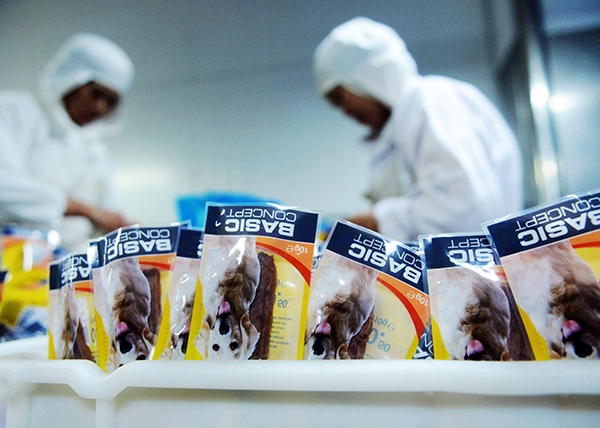China's local consumer brands gain more market share
By Wang Zhuoqiong (China Daily) Updated: 2016-06-29 07:57
 |
|
Workers pack dog food at a factory in Qingdao, Shandong province. The growth rate in the value of fast-moving consumer goods in China was 3.5 percent in 2015. [Yu Fangping/For China Daily] |
The fifth annual China Shopper Report, issued by Bain & Company and Kantar Worldpanel, suggests that the rise of the service sector in China and its higher paying jobs has helped boost growth among brands in premium categories, such as yogurt and pet food. It also says that foreign brands are continuing to lose battles to local brands in this sector.
Brands in categories that traditionally cater to blue-collar workers are suffering as many manufacturing jobs move to lower-cost countries. For example, in 2015, sales of instant noodles declined by 12.5 percent and beer by 3.6 percent.
Last year, local companies' sales grew by nearly 8 percent and continue to gain share over their foreign rivals. Their biggest advance occurred in skin care, baby diapers, hair conditioners, toothpaste and shampoo.
Foreign companies generated their greatest share increase in fabric softener, infant formula, instant noodles and beer. However, foreign brands overall declined by 1.4 percent in 2015.
"Local companies have wider distribution networks particularly in lower-tier cities where growth is higher. They can make faster decisions and are more adaptable in the digital environment than their foreign peers, achieving a higher growth rate," said Jason Yu, general manager of Kantar Worldpanel China.
For example, Shanghai Jahwa uses its knowledge of Chinese herbal beauty therapy to win over consumers.
The country's retail landscape has also evolved with smaller formats continuing to gain momentum. Notably, convenience stores generated 13.2 percent growth in value last year, catering to cash-rich and time-poor urban consumers.
Online shopping continues to define the modern retail environment in China. Over the last four years, e-commerce in China has grown at an annual rate of about 37 percent and generated revenue of nearly 4 trillion yuan. The report has found that baby-related categories and skin care continue to dominate the e-commerce market.
- Regional jet airliner makes maiden flight
- Yum's mainland stake sale 'postponed'
- China's local consumer brands gain more market share
- Haier to be innovation platform for corporate cultures to coexist
- Fantawild rides boom in Chinese mainland theme parks
- My personal sadness to see the UK leaving EU
- AIIB rules out irrational financing moves
- Top 10 Chinese universities with generous online shoppers


















